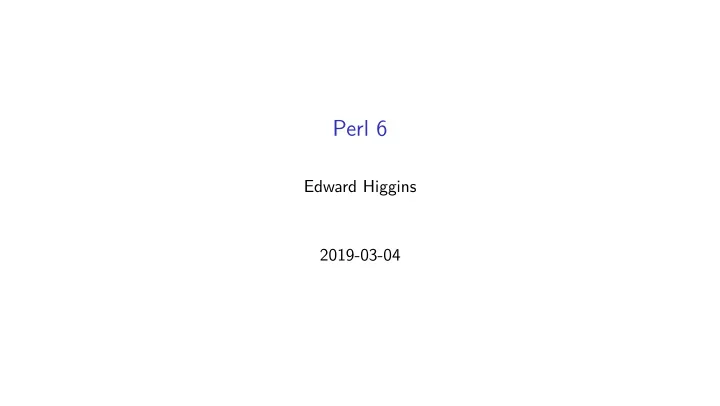

Perl 6 Edward Higgins 2019-03-04
Perl 6 A language for the 21st Century [ Originally presented in Vim, ] [ best viewed in a full-screen terminal at 70x20 characters ]
In the beginning...
In the beginning... C sh awk sed grep
In the beginning... C \ sh \ awk :=> Perl 1.0 sed / grep /
(1987) Perl 1.0 (1988) Perl 2.0 (1989) Perl 3.0 (1991) Perl 4.0 (1994) Perl 5.0
Perl 5 | Perl 6 ------------|-------------------------- | (2000) Perl 5.6 | Design process anounced | (2002) Perl 5.8 | Dev. on Parrot VM | (2009) Perl 5.10 | Dev. moved to Rakudo VM | (2015) Perl 5.22 | Perl 6.c (First stable release) | (2018) Perl 5.28 | Perl 6.d
The Perl Philosophy Natural language inspired - Flexible, malleable, expressive - Dialects are okay - The language grows with you - Context is important
The Perl Philosophy TIMTOWTDOI (There's more than one way to do it) DWIM (Do what I mean) Easy things should be easy, hard things should be possible Give the user enough rope to shoot themselves in the foot
The Perl 6 Philosophy Easy things should stay easy, hard things should get easier No arbitray limits Similar things should look similar Visual distinctions are important -Ofun
# Variables my $scalar = 3.14; my @array = (1, 2, 3); my %hash = first-name => " Larry " , surname => " Wall " ;
# Typed Variables my Rat $scalar = 3.14; my Int @array = (1, 2, 3); my Str %hash = first-name => " Larry " , surname => " Wall " ;
# More Variables my Num $scalar = pi; my Int @array = (1, 2, 3); my Str %hash; %hash<first-name> = " Larry " ; %hash<surname> = " Wall " ;
# Rational numbers say 0.1.Rat + 0.2.Rat == 0.3.Rat;
# Floating point numbers say 0.1.Num + 0.2.Num == 0.3.Num;
# Numbers? say 0.1 + 0.2 == 0.3;
# if-then-else my $age = 3; if $age < 18 { say " You can't drink in the UK yet " ; } elsif 18 <= $age <= 20 { say " You can't drink in the USA yet " ; } else { say " You can drink (almost) anywhere! " ; }
# given-when my UInt $age = 19; given $age { when 0..17 { say " You can't drink in the UK yet " } when 18..20 { say " You can't drink in the USA yet " } default { say " You can drink (almost) anywhere! " } }
# for loops for (0 ... 10) -> $x { print " $x " ; }
# for loops for (0 ...^ 10) -> $x { print " $x " ; }
# for loops for ^10 -> $x { print " $x " ; }
# Sequences my @integers = 1 ... *; say @integers[^20];
# Sequences my @evens = 2, 4 ... *; say @evens[^10];
# Sequences my @powers = 2, {2 * $^x} ... *; say @powers[^10];
# Sequences my @powers = 2, 4, 8 ... *; say @powers[^10];
# Sequences my @fibonacci = 0, 1, 1 ... *; say @fibonacci[^10];
# Sequences my @fibonacci = 0, 1, {$^x + $^y} ... *; say @fibonacci[^10];
# Metaoperators my @a = ( 1, 2, 3); my @b = (10, 20, 30); say @a <<+>> @b; say 2 <<*<< @a; say [lcm] @a;
# Hyperoperators my @a = (1,2,3); my @b = <a b c>; say @a X @b; say @a Z @b;
# Hyperoperators my @a = (1,2,3); my @b = <a b c>; say @a X~ @b; say @a Z~ @b;
# Object Oriented class Dog { }
# Object Oriented class Dog { has Str $.name is required; has Int $.age; method bark(Str $target) { say " $!name barked at $target " ; } }
# Object Oriented class Dog { has Str $.name is required; has Int $.age; method bark(Str $target) { say " $!name barked at $target " ; } } my Dog $fido = Dog.new(name => " Fido " ); $fido.bark( " the audience " );
# Functional sub add($a, $b) { return $a + $b } sub make_add($b) { return sub ($a) { add($a, $b) } } my &add_3 = make_add(3); say add_3(2);
# Functional my &add_3 = * + 3; say add_3(2);
# Multi-dispatch multi sub sort(@list where *.elems < 2) { return @list; } multi sub sort(@list where *.elems >= 2) { my $pivot = @list[0]; my @before = @list[1 .. *].grep( * before $pivot); my @after = @list[1 .. *].grep( * !before $pivot); return flat sort(@before), $pivot, sort(@after); } say sort (14, 1, 61, 25, 8);
# Regular Expressions my $string = " length = 5 " ; $string ~~ / length \s* "=" \s* (\d+) / ; say $0.Int;
# Regular Expressions my $string = " length = 5 " ; $string ~~ / length \s* "=" \s* $<length> = (\d+) / ; say $<length>;
# Regular Expressions grammar Params { rule TOP { <assignment>+ } rule assignment { <param> " = " <value> " ; " } token param { <.alpha>+ } token value { <.digit>+ } } my $string = " length = 5; width = 20; time = 4; " ; my $parsed = Params.parse($string); say $parsed;
# Concurrency my $promise = start { my $x = 0; for 1 ... 10 -> $i { $x += $i } $x; } my $result = await $promise; say $result;
# Concurrency my $veg_supplier = Supplier.new; my $feedback = supply { whenever $veg_supplier.Supply { emit( " We've got veg: " ~ $_); }; } $feedback.tap( -> $str { say " $str " }); $veg_supplier.emit( " Radish " ); $veg_supplier.emit( " Lettuce " ); $veg_supplier.emit( " Tomato " );
Useful Links The Perl 6 documentation https://docs.perl6.org Rakudo, a Perl 6 implementation https://rakudo.org Online REPL https://glot.io/new/perl6 Rosetta Code https://rosettacode.org
Recommend
More recommend